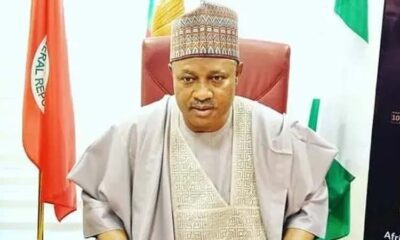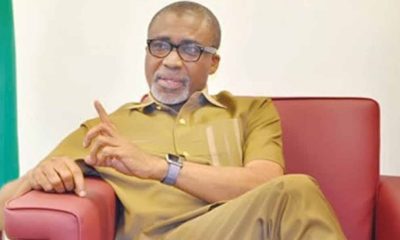News
NASS excludes state police, restructuring from 68 amendments

State police and restructuring are not included in the 68 amendments proposed by the Joint Senate and House of Representatives’ Special Ad Hoc Committee on the Review of the 1999 Constitution.
Also, powers granted by court to the states to collect Value Added Tax may be reversed as the National Assembly will vote on whether VAT should remain on the concurrent legislative list or be moved to the exclusive list.
Members of the National Assembly are billed to vote on the recommendations on Tuesday and Wednesday after which the proposal would be sent to the states for concurrence. At least 24 Houses of Assembly must concur for any provision to scale through.
The Punch reports that there were demands for restructuring and return to the regional system of government, with some Nigerians specifically seeking conversion of the six geopolitical zones or states to federating units.
But the National Assembly is only considering devolution of powers from the Federal Government to the state and local governments by moving some items from the exclusive legislative list to the concurrent list.
Some senior advocates who spoke to The PUNCH, however, argued that VAT should not be placed on the exclusive legislative list.
Adegoke Rasheed (SAN), said while the National Assembly could not be stopped from performing its constitutional duties, the process would not be successful, adding that two-thirds of states would not support the decision to put VAT on the exclusive list.
Adegoke said, “I would consider the mentality of our legislators to be unitary and not federal in nature. I don’t think there is any sense in it to include the collection of VAT in the exclusive list. To achieve what? To make more money available at the centre? It was the military intervention that made the government at the centre to be collecting VAT.
“Under the 1979 constitution, VAT was not different from the sales tax. It is better if we are going to assist the states to develop at their own pace and have the capacity to generate more IGR. It is better to designate the collection of VAT as residual matter rather than making it an item on the exclusive list. They should reject it. They should realise that they are from various states that are struggling to survive.”
He stated that the decision to bring the matter on the exclusive list was against the federalism we practise in the country, calling on the legislators to reject the bill.
Another Senior Advocate of Nigeria, Ebun-Olu Adegboruwa said the state governments who took the matter to court should notify the court if it would affect the matter, saying that the court cannot stop the legislators from making law.
He said, “The case pending is in court. There is nothing stopping them from discharging their legislative duties. Within the court generally, our understanding is that the court would not stop the legislature from performing constitutional responsibilities of lawmaking but if after they make the law and then parties that are in court feel that the law would overreach the case that is pending in court, they can bring the amendment before the supreme court to decide on it, but the court would not stop the assembly from performing its duties.”
Adegboruwa stressed that the purpose of devolution of power would be defeated if VAT was placed on the exclusive list.
Adegboruwa added, “My position is that VAT is a matter for the states. You cannot be approbating and reprobating. The purpose of this amendment is to achieve devolution of power by giving more powers to the state and shedding the federal government of its weight.
“Then moving VAT to the exclusive list would be drawing us back to the unitary system of government. There is an inconsistency on the part of the National Assembly if, on the one hand, it is seeking to remove matters such as electricity from the Federal Government and taking VAT to the Federal Government. VAT should be for the state generating the tax for itself. There’s no basis for voting VAT to be on the exclusive list.
“If they vote it to be on the exclusive list, it would be a matter for the Supreme Court to decide as to the effect of that, because the suit had commenced before the amendment took place. If the amendment succeeds, the matter would become more or less academic.”
Also speaking with The PUNCH, a human rights lawyer, Femi Falana (SAN), said states would not vote in support of the amendment.
He advised the National Assembly to await the outcome of the matter at the Supreme Court rather than amend the constitution.
He said, “The matter is pending before the Supreme Court, the National Assembly should wait. I would advise them to await the judgment of the court. Assuming the Supreme Court says the Federal High Court was wrong, so what would be the basis of amending the constitution?”
Falana said he was confident that the states would not concur with the National Assembly if VAT is placed on the exclusive list.
The Lagos State Government, which is one of the parties to the suit before the Supreme Court, also stated that VAT should be left for the states to collect.
The Commissioner for Information, Mr Gbenga Omotoso, disclosed this on Sunday during a phone interview with The PUNCH. He, however, has said the state government would abide by any decision made by the National Assembly.
He said, “I cannot dictate to the National Assembly, because we belong to the executive and the legislature has their own rules and regulations and their own powers. It is all about the separation of powers and democracy.
“But what we are after concerning VAT is that the states should be the ones to collect it, and any decision that the legislature or the judiciary makes about this, we will abide by it, so long as it has to do with equity, justice and fairness, so long as it is a matter of what is good for our democracy, and fiscal federalism.
“So I know that the National Assembly, being the home of lawmakers and lawmaking, will do the right thing – anything that will further the interest of democracy and true federalism, and in the interest of justice – and I think that is what they will do.”
News
Nigeria Customs Service begins 2025 recruitment [How to apply]

Nigeria Customs Service begins 2025 recruitment [How to apply]
The Nigeria Customs Service (NCS) has announced the commencement of its recruitment exercise, assuring Nigerians that the process is entirely free and fair.
The agency has cautioned the public to be vigilant against scammers who may attempt to exploit unsuspecting applicants during the recruitment period.
Applications are invited for positions in the Superintendent, Inspector, and Customs Assistant cadres as part of the Service’s plan to recruit 3,927 officers in 2025.
This initiative is aimed at enhancing trade facilitation and supporting Nigeria’s economic recovery efforts.
“Our recruitment is entirely free and fair. At no stage do we charge fees. Anyone requesting payment is a scammer,” the agency emphasized, urging applicants to be wary of fraudulent schemes.
READ ALSO:
- Dangote, Tinubu, Lookman, Badenoch named among 100 most influential Africans in 2024
- Heavy security in Ilesa as ex-Osun deputy gov emerges new Owa-Obokun
- Hacker has stolen N180m from my NGO account – VeryDarkMan cries out
The NCS outlined eligibility criteria, stating that applicants must be Nigerian citizens by birth, possess a valid National Identification Number (NIN), and have no criminal record or ongoing investigations.
Academic qualifications for the three cadres are as follows:
Superintendent Cadre: A university degree or Higher National Diploma (HND) along with an NYSC discharge or exemption certificate.
Inspectorate Cadre: A National Diploma (ND) or Nigeria Certificate in Education (NCE) from an accredited institution.
Customs Assistant Cadre: At least an O’Level certificate (WAEC or NECO).
In addition to these qualifications, the NCS stressed that all applicants must be physically and mentally fit, providing evidence of medical fitness from a recognized government hospital.
Nigeria Customs Service begins 2025 recruitment [How to apply]
News
Tinubu to critics: I won’t reduce my cabinet size

Tinubu to critics: I won’t reduce my cabinet size
President Bola Tinubu on Monday unequivocally responded to critics who described his cabinet as “bloated” by saying he is unprepared to reduce the size of his 48-man cabinet.
“I am not ready to shrink” the size of my cabinet, Tinubu said during a media chat at his Bourdillon residence in the highbrow Ikoyi area of Lagos State.
“I am not prepared to bring down the size of my cabinet,” the former Lagos governor said, arguing that “efficiency” has been at the core of his selection of ministers.
The president also said he has no regret removing the petrol subsidy in May 2023, saying Nigeria cannot continue to be Father Christmas to neighbouring countries.
READ ALSO:
- Kolawole Erinle: Appeal court affirms sentence for ex-convict over $1.4m fraud
- We’ve forced Lakurawa terrorists back to Mali, says FG
- Petrol: MRS enforces N935 per litre nationwide
“I don’t have any regrets whatsoever in removing petrol subsidy. We are spending our future, we were just deceiving ourselves, that reform was necessary,” he told reporters.
Tinubu appointed 48 ministers in August 2023, three months after his inauguration. The Senate immediately screened and confirmed the ministers. One of the ministers, Betta Edu, was suspended in January while another, Simon Lalong, moved to the Senate.
There were calls for the President to reshuffle his cabinet as many Nigerians have not been impressed by the performance of some of the ministers, especially in the face of unprecedented inflation, excruciating economic situation and rising insecurity.
In October 2024, Tinubu re-assigned 10 ministers to new ministerial portfolios and appointed seven new ministers for Senate confirmation. He also sacked five of his ministers but critics insist that the President’s cabinet remains large, especially with the creation of a Livestock Ministry with a minister.
Tinubu to critics: I won’t reduce my cabinet size
News
Tinubu: Food stampede incidents, grave error

Tinubu: Food stampede incidents, grave error
..Don’t publicise gifts distribution if you don’t have enough
President Bola Tinubu has described the recent three stampede incidents during distribution of relief materials to children and others as a grave error.
He told people to be more organised and stay away from giving palliative or publicity of the giving if they had insufficient materials.
He stated this during his first presidential media chat on Monday.
The President said he had been sharing palliatives in his Lagos residence for 25 years without any incident and blamed the recent food stampedes in the country on poor organisation.
A total of 35 children died on December 18 during a stampede that happened at a funfair event in Ibadan, Oyo State.
10 people, including children, also died on December 21 in another stampede at the Holy Trinity Catholic Church in the Maitama district of Abuja during the distribution of palliatives.
Another 22 people were reported dead during a rice distribution event at Amaranta Stadium in Ojika, Ihiala LGA, on the same day.
“It’s unfortunate and very sad, but we will continue to learn from our mistakes. I see this as a grave error on the part of the organisers,” he said.
But the President insisted that the incidents should not dampen the “happiness of the season”.
“It is very sad that people are not well organised. We just have to be more disciplined in our society. Condolences to those who lost members, but it is good to give,” Tinubu said.
“I’ve been giving out foodstuff and commodities, including envelopes in Bourdillon, for the last 25 years, and I’ve never experienced this kind of incident because we are organised and disciplined.
“If you know you won’t have enough to give, don’t attempt to give or publicise it.”
The President compared the situation to food banks in countries such as the United States of America (USA) and Britain, noting their structured approach.
“Every society, even in America, has food banks. They have hungry people. In Britain, they have food banks and warehouses, and they are organised. They take turns m lining up and collect,” he added.
-

 Business2 days ago
Business2 days agoBe creative, monarch, others challenge Muslim professionals on economic revival
-

 Auto2 days ago
Auto2 days agoLSM MD extols founder’s qualities after latter posthumous industry award
-

 Entertainment2 days ago
Entertainment2 days agoMultiChoice announces free access to all DSTV channels for 3 days
-

 metro2 days ago
metro2 days agoJigawa State governor loses son 24 hours after mother’s death
-

 News1 day ago
News1 day agoNigeria Customs Service begins 2025 recruitment [How to apply]
-

 metro1 day ago
metro1 day agoHeavy security in Ilesa as ex-Osun deputy gov emerges new Owa-Obokun
-

 metro1 day ago
metro1 day agoLagos Imam to Tinubu: You haven’t disappointed us
-

 metro1 day ago
metro1 day agoDangote, Tinubu, Lookman named among 100 most influential Africans in 2024 (Full list)













